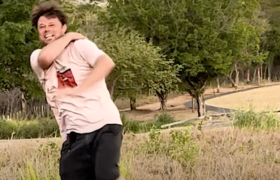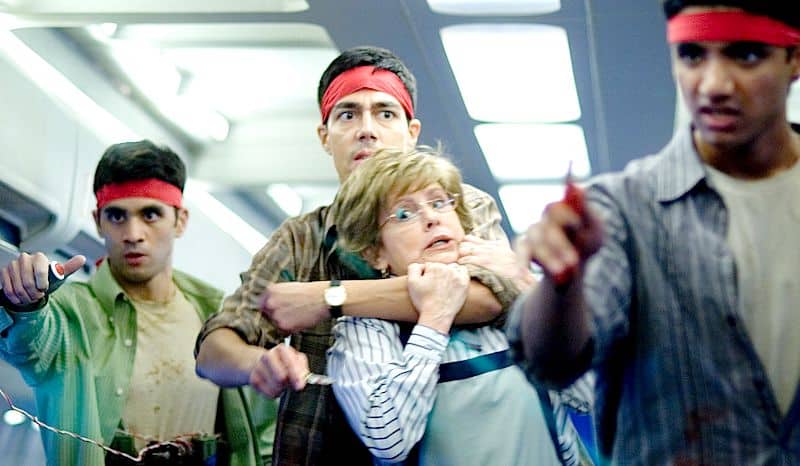"Not only did our leaders fail us, worse, we failed ourselves by abandoning our core values and following them down roads to nowhere that have left us embittered and Balkanized."
(Editor’s note: Peter Maguire, is a surfer, war crimes investigator and author of Thai Stick: Surfers, Scammers, and the Untold Story of the Marijuana Trade (film rights optioned by Kelly Slater), Law and War – a book about the Nuremberg Trials, Facing Death in Cambodia, and Breathe, the new bio on jiujitsu icon Rickson Gracie. His substack Sour Milk is a pushback against what Maguire says is “the intolerant and censorious tides that are sweeping the nation.”)
BeachGrit readers, below is the final instalment of Sour Milk’s three part 9/11 commemoration (read parts one and two, here). This series was motivated by the saccharine, sentimental, yet totally unreflective celebration of the 20th anniversary of the attacks and recent attempts to revise the historical reputation of the Bush administration.
I will keep it short and let the dramatis personae speak for themselves.
After 9/11, American leaders, with overwhelming popular support, traded freedom for safety. Overnight, the land of the free and the home of the brave became the land of the surveilled and the home of the scared.
Not only did our leaders fail us, worse, we failed ourselves by abandoning our core values and following them down roads to nowhere that have left us embittered and Balkanized.
If we are to contain and excise the deep and systematic rot of corruption, cynicism, and opportunism that now infects our republic, the United States needs some form of reckoning, even if it is only historical.
Why?
Because the politicians, policy makers, and pundits who acted as the architects and cheerleaders of America’s imperial experiment have never been held accountable for the eight-trillion dollar failure.
If nothing else, we owe it to the 7,057 dead U.S. soldiers, the 30,177 active duty service members and veterans who have committed suicide since 2001, and the 929,000 subalterns who all died in the Global War on Terrorism. [1]
Let’s take a trip down memory lane.
Presidential Candidate George W. Bush—2000
“It must be in the national interests, must be in our vital interests whether we ever send troops. The mission must be clear. Soldiers must understand why we’re going. The force must be strong enough so that the mission can be accomplished. And the exit strategy needs to be well-defined. I’m concerned that we’re over deployed around the world.” October 17, 2000
President George W. Bush—2001
“A dictatorship would be a heck of a lot easier, there’s no question about it.” July 30, 2001
“Just three days later removed from these events, Americans do not yet have the distance of history. But our responsibility to history is already clear: to answer these attacks and rid the world of evil.” September 14, 2001
“This crusade, this war on terrorism is going to take a while.” September 16, 2001
“We will rid the world of the evil-doers.” October 16, 2001
“You are either with us or you are against us in the fight against terror.” November 6, 2001
Vice President Dick Cheney—2001
“We also have to work, though, sort of the dark side, if you will.” September 16, 2001
“It’s been pretty well confirmed that [Mohammed Atta] did go to Prague and he did meet with a senior official of the Iraqi intelligence service in Czechoslovakia last April.” December 9, 2001
Secretary of Defense Donald Rumsfeld—2001
“Judge whether good enough hit S.H. [Saddam Hussein] at same time. Not only UBL [Usama bin Laden]…. Go massive. Sweep it all up. Things related and not.” (Rumsfeld’s personal note) September 11, 2001
Richard Perle (Chairman of the Pentagon’s Defense Policy Board) —2001
“Iraq is a very wealthy country. Enormous oil reserves. They can finance, largely finance the reconstruction of their own country. And I have no doubt that they will….I would be surprised if we need anything like the 200,000 figure that is sometimes discussed in the press. A much smaller force, principally special operations forces, but backed up by some regular units, should be sufficient.” March 17, 2001
Judith Miller (The New York Times) —2001
“If verified, Mr. Saeed’s allegations would provide ammunition to officials within the Bush administration who have been arguing that Mr. Hussein should be driven from power partly because of his unwillingness to stop making weapons of mass destruction, despite his pledges to do so.” December 20, 2001
William Safire (The New York Times) —2001
“The undisputed fact connecting Iraq’s Saddam Hussein to the September 11 attacks is that Mohammed Atta, who died at the controls of an airliner-missile, flew from Florida to Prague to meet on April 8 of this year with Ahmed al-Ani, the Iraqi consul.” November 12, 2001
Richard Cohen (The New York Times)—2001
“America is now getting a taste of the havoc biological weapons can wreak…. Such a weapon in the hands of a thug is untenable…Saddam and his bloody bugs have to go.” October 18, 2001
William Kristol (Project For A New American Century)—2001
“I think Iraq is, actually, the big unspoken elephant in the room today. There’s a fair amount of evidence that Iraq had very close associations with Osama bin Laden in the past.” September 12, 2001
Max Boot, (LA Times/Council on Foreign Relations) —2001
“Afghanistan and other troubled lands today cry out for the sort of enlightened foreign administration once provided by self-confident Englishmen in jodhpurs and pith helmets. October 15, 2001
President George W. Bush—2002
“I will not wait on events while dangers gather. I will not stand by as peril draws closer and closer. The United States of America will not permit the world’s most dangerous regimes to threaten us with the world’s most destructive weapons.” January 20, 2002
“States like these, and their terrorist allies, constitute an axis of evil, arming to threaten the peace of the world. By seeking weapons of mass destruction, these regimes pose a grave and growing danger.” January 29, 2002
“I don’t know where he [Osama bin Laden] is. You know, I just don’t spend that much time on him…I truly am not that concerned about him.” March 13, 2002
“I cannot speak strongly enough about how we must collectively get after those who kill in the name of—in the name of some kind of false religion.” August 2, 2002
“The danger to our country is grave….According to the British government, the Iraqi regime could launch a biological or chemical attack in as little as 45 minutes after the orders were given.” September 26, 2002
“We’ve learned that Iraq has trained al-Qaida members in bomb-making and poisons and deadly gases. And we know that after September 11 Saddam Hussein’s regime gleefully celebrated the terrorist attacks on America….America must not ignore the threat gathering against us. Facing clear evidence of peril, we cannot wait for the final proof—the smoking cloud—that could come in the form of a mushroom cloud.” October 7, 2002
“I’m the commander—see, I don’t need to explain—I do not need to explain why I say things. That’s the interesting thing about being the president.” November 19, 2002
“Our intelligence sources tell us that [Saddam] has attempted to purchase high-strength aluminum tubes suitable for nuclear weapons production.” December 31, 2002
Vice President Dick Cheney—2002
“Simply stated, there is no doubt that Saddam Hussein now has weapons of mass destruction; there is no doubt that he is amassing them to use against our friends, against our allies, and against us….After liberation, the streets in Basra and Baghdad are sure to erupt in joy.” August 26, 2002
Secretary of State Colin Powell—2002
“They have chemical weapons; they have biological weapons; they’re trying to acquire nuclear weapons.” October 22, 2002
Secretary of Defense Donald Rumsfeld—2002
“They have weaponized chemical weapons, we know that.” June 10, 2002
“[Saddam’s] regime has amassed large clandestine stocks of biological weapons, including anthrax and botulism toxin and possibly smallpox. His regime has amassed large clandestine stockpiles of chemical weapons, including VX and sarin and mustard gas.” September 18, 2002
“[Saddam’s] facilities are mobile; they have been widely dispersed to a number of locations; [he has] vast underground networks and facilities, and sophisticated denial and deception techniques. In addition, [weapons and military facilities] have been placed in close proximity to hospitals, schools, and mosques.” September 27, 2002
Senator Hillary Clinton—2002
“In the four years since the inspectors left, intelligence reports show that Saddam Hussein has worked to rebuild his chemical and biological weapons stock, his missile delivery capability, and his nuclear program. He has also given aid, comfort, and sanctuary to terrorists, including Al Qaeda members….It is clear…that if left unchecked, Saddam Hussein will continue to increase his capacity to wage biological and chemical warfare, and will keep trying to develop nuclear weapons.” October 10, 2002
British Prime Minister Tony Blair—2002
“Some of these weapons are deployable within 45 minutes of an order to use them.” September 24, 2002
Richard Perle (Chairman of the Pentagon’s Defense Policy Board)—2002
“Iraq is a very wealthy country. Enormous oil reserves. They can finance, largely finance the reconstruction of their own country. And I have no doubt that they will.” July 11, 2002
“I don’t believe that anything like a long-term commitment of 150,000 Americans would be necessary.” October 3, 2002
Glenn Hubbard (White House Economic Adviser) —2002
“The costs of any intervention would be very small.” October 4, 2002
Douglas Feith (Undersecretary of Defense for Policy) —2002
“Several workers at Prague airport identified Atta following 9/11 and remember him traveling with his brother Farhan Atta.” September 16, 2002
Lawrence Lindsey (White House Economic Adviser)
“The likely economic effects [of a war in Iraq] would be relatively small…. Under every plausible scenario, the negative effect will be quite small relative to the economic benefits.” September 16, 2002
Kenneth M. Pollack, (former Director of Persian Gulf Affairs, National Security Council) —2002
“It is unimaginable that the United States would have to contribute hundreds of billions of dollars and highly unlikely that we would have to contribute even tens of billions of dollars….The only prudent and realistic course of action left to the United States is to mount a full-scale invasion of Iraq to smash the Iraqi armed forces, depose Saddam’s regime, and rid the country with weapons of mass destruction.” September, 2002
Congresswoman Nancy Pelosi—2002
“Saddam Hussein certainly has chemical and biological weapons. There’s no question about that.” November 12, 2002
Richard Dearlove (Head of British Foreign Intelligence) —2002
“Military action was now seen as inevitable, Bush wanted to remove Saddam, through military action, justified by the conjunction of terrorism and WMD. But the intelligence and facts were being fixed around the policy.” Downing Street Memo, July 23, 2002
Judith Miller and Michael Gordon (The New York Times) —2002
“Iraq has stepped up its quest for nuclear weapons and has embarked on a worldwide hunt for materials to make an atomic bomb.” September 8, 2002
“In the last 14 months, Iraq has sought to buy thousands of specially designed aluminum tubes…intended as components of centrifuges to enrich uranium.” September 8, 2002
“The dominant view [is] that the tubes [are] for Iraq’s nuclear program…only one of several indications that Iraq [is] reconstituting and expanding its effort to acquire nuclear weapons.” September 13, 2002
Judith Miller (The New York Times) —2002
“Iraq has ordered large quantities of a drug that can be used to counter the effects of nerve gas, mainly from suppliers in Turkey.” November 12, 2002
Thomas Friedman (The New York Times)
“You win the presidency by connecting with the American people’s gut insecurities and aspirations. You win with a concept. The concept I’d argue for is ‘neoliberalism.’ More Americans today are natural neolibs, than neocons. Neoliberals believe in a muscular foreign policy and a credible defense budget, but also a prudent fiscal policy that balances taxes, deficit reduction and government services.” June 11, 2002
Robert Kagan and William Kristol (The Project For A New American Century) —2002
“We know that Mohammed Atta, the ringleader of September 11th, went out of his way to meet with an Iraqi intelligence official a few months before he flew a plane into the WTC.” January 21, 2002
President George W. Bush—2003
“You said we’re headed to war in Iraq—I don’t know why you say that. I hope we’re not headed to war in Iraq. I’m the person who gets to decide, not you.” January 28, 2003
“The British government has learned that Saddam Hussein recently sought significant quantities of uranium from Africa.” January 28, 2003
“The war on terror involves Saddam Hussein because of the nature of Saddam Hussein, the history of Saddam Hussein, and his willingness to terrorize himself.” January 29, 2003
“All the world has now seen the footage of an Iraqi Mirage aircraft with a fuel tank modified to spray biological agents over wide areas. Iraq has developed spray devices that could be used on unmanned aerial vehicles with ranges far beyond what is permitted by the Security Council. A UAV [unmanned aerial vehicle] launched from a vessel off the American coast could reach hundreds of miles inland.” February 6, 2003
“Oh, no, we’re not going to have any casualties.” March, 2003
“We will fight terrorism in all its forms. Iraq must never again be a haven for terrorists of any kind.” March 6, 2003
“Our mission is clear in Iraq. Should we have to go in, our mission is very clear: disarmament.” March 6, 2003
“American and coalition forces are in the early stages of military operations to disarm Iraq, to free its people and to defend the world from grave danger.” March 20, 2003
“Eighteen months ago, this building came under attack. From that day to this, we have been engaged in a new kind of war—and we are winning.” March 25, 2003
“Our forces have been given a clear mission: to end a regime that threatened its neighbors and the world with weapons of mass destruction and to free a people that had suffered far too long.” April 14, 2003
“Major combat operations in Iraq have ended. In the battle of Iraq, the United States and our allies have prevailed.” May 2, 2003
“We found the weapons of mass destruction. We found biological laboratories. You remember when Colin Powell stood up in front of the world, and he said, Iraq has got laboratories, mobile labs to build biological weapons. They’re illegal. They’re against the United Nations resolutions, and we’ve so far discovered two. And we’ll find more weapons as time goes on. But for those who say we haven’t found the banned manufacturing devices or banned weapons, they’re wrong, we found them.” May 29, 2003
“God told me to strike at al Qaeda and I struck them, and then he instructed me to strike at Saddam, which I did, and now I am determined to solve the problem in the Middle East. If you can help me I will act, and if not, the elections will come and I will have to focus on them.” June 3, 2003, speaking to Palestinian Prime Minister Mahmoud Abbas
“The United States is committed to the worldwide elimination of torture, and we are leading this fight by example.” June 26, 2003
“The United States is committed to the worldwide elimination of torture and we are leading this fight by example…. I call on all governments to join with the United States and the community of law-abiding nations in prohibiting, investigating, and prosecuting all acts of torture and in undertaking to prevent other cruel and unusual punishment.” June 26, 2003
“Iraqi democracy will succeed, and that success will send forth the news, from Damascus to Tehran—that freedom can be the future of every nation. The establishment of a free Iraq at the heart of the Middle East will be a watershed event in the global democratic revolution.” November 6, 2003
“We’ve reached another great turning point—and the resolve we show will shape the next stage of world development.” December 6, 2003
Vice President Dick Cheney—2003
“We know [Saddam has] been absolutely devoted to trying to acquire nuclear weapons, and we believe he has, in fact, reconstituted nuclear weapons….My belief is we will, in fact, be greeted as liberators.” March 16, 2003
“I’m not willing at all at this point to buy the proposition that somehow Saddam Hussein…had no WMD and some guy out at the CIA, because I called him, cooked up a report saying he did. That’s crazy.” September 14, 2003
Secretary of State Colin Powell—2003
“What I want to bring to your attention today is the…sinister nexus between Iraq and the Al Qaeda terrorist network, a nexus that combines classic terrorist organizations and modern methods of murder.”
“We have first-hand descriptions of biological weapons factories on wheel and on rails. Our conservative estimate is that Iraq today has a stockpile of between one hundred and five hundred tons of chemical weapons agents.”
[Saddam] remains determined to acquire nuclear weapons….
“Ladies and Gentlemen, these are not assertions. These are facts, corroborated by many sources, some of them sources of the intelligence services of other countries….An Iraqi major, who defected, confirmed that Iraq has mobile biological research laboratories.”
“We have diagrammed what our sources reported about these mobile facilities.” February 5, 2003
Secretary of Defense Donald Rumsfeld—2003
“Secretary Powell…presented, not opinions, not conjecture, but facts demonstrating Iraq’s…ties to terrorist networks, including al-Qaeda-affiliated cells operating in Baghdad…. The threat is there to see.” February 8, 2003
“The United States is not interested in the oil in that region from Iraq. That’s just utter nonsense.” February 25, 2003
“The idea that it would take several hundred thousand U.S. forces, I think, is far from the mark.” February 27, 2003
“Today, we lack metrics to know if we are winning or losing the global war on terror. Are we capturing, killing or deterring and dissuading more terrorists every day than the madrassas and the radical clerics are recruiting, training and deploying against us? Does the US need to fashion a broad, integrated plan to stop the next generation of terrorists? The US is putting relatively little effort into a long-range plan, but we are putting a great deal of effort into trying to stop terrorists. The cost-benefit ratio is against us! Our cost is billions against the terrorists’ cost of millions.” March 3, 2003
“We know he continues to hide biological and chemical weapons, moving them to different locations as often as every 12 to 24 hours, and placing them in residential neighborhoods.” March 11, 2003
“When it comes to reconstruction, before we turn to the American taxpayer, we will turn first to the resources of the Iraqi government and the international community.” March 27, 2003
“We know where they are. They’re in the area around Tikrit and Baghdad and east, west, south, and north somewhat.” March 30, 2003
“Think what’s happened in our cities when we’ve had riots, and problems, and looting….Stuff happens….And it’s untidy, Freedom’s untidy, and free people are free to make mistakes and commit crimes and do bad things.” April 11, 2003
“Colin Powell, if you may recall, at the UN mentioned the existence of…mobile biological laboratories and two of those are now in our custody.” May 27, 2003
“Pockets of dead-enders are trying to reconstitute. General [Tommy] Franks and his team are rooting them out.” June 18, 2003
Paul Wolfowitz (Deputy Secretary of Defense)—2003
“I don’t want to make a prediction…but you’re going to find, and this is very important, you’re going to find Iraqis out cheering American troops.” February 23, 2003
“I am reasonably certain that they will greet us as liberators, and that will help us keep [troop] requirements down…. We can say with reasonable confidence that the notion of hundreds of thousands of American troops is way off the mark…wildly off the mark.” February 27, 2003
“I think the ethnic differences in Iraq are there but they’re exaggerated.” March 5, 2003
“There are al-Qaeda terrorists who operate in and out of Iraq. Secretary Powell was quite explicit about some of them in his speech to the United Nations. That by itself would be justification for military action. Not as openly as they did in Afghanistan, for obvious reasons. Saddam is not quite as foolish as the Taliban. But the support for terrorism is clear-cut. The support for al Qaeda is clear-cut.” March 5, 2003
“There is a lot of money to pay for this that doesn’t have to be U.S. taxpayer money, and it starts with the assets of the Iraqi people. We are talking about a country that can really finance its own reconstruction and relatively soon.” March 27, 2003
“I’m not concerned about weapons of mass destruction…. I didn’t come [to Iraq] in a search for weapons of mass destruction.” July 22, 2003
British Prime Minister Tony Blair—2003
“On weapons of mass destruction, we know that the regime has them, we know that as the regime collapses we will be led to them.” April 8, 2003
“I’m ready to meet my Maker and answer for those who have died or been horribly maimed as a result of my decisions.” May 5, 2003
“More than 125,000 American troops occupy Mesopotamia. They are backed up by the resources of the world’s richest economy. In a contest for control of Iraq, America can outspend and outmuscle any competing faction.” May 6, 2003
General Eric Shinseki—2003
“I would say that what’s been mobilized to this point—something on the order of several hundred thousand soldiers are probably, you know, a figure that would be required.” February 25, 2003
Paul Bremer—2003
“The loss of innocent life is a tragedy for anyone involved in it, but the numbers are really very low.” August 17, 2003
Richard Perle (Chairman of the Pentagon’s Defense Policy Board) —2003
“Saddam Hussein…will go quickly but not alone: in a parting irony, he will take the U.N. down with him…. As we sift the debris, it will be important to preserve, the better to understand, the intellectual wreckage of the liberal conceit of safety through international law administered by international institutions.” March 21, 2003
“From start to finish, President Bush has led the United States and its coalition partners to the most important military victory since World War II…. This was a war worth fighting. It ended quickly with few civilian casualties and with little damage to Iraq’s cities, towns or infrastructure…. It ended…without the quagmire [the war’s critics] predicted…. Iraqis are freer today and we are safer. Relax and enjoy it.” May 1, 2003
“And a year from now, I’ll be very surprised if there is not some grand square in Baghdad that is named after President Bush. There is no doubt that, with the exception of a very small number of people close to a vicious regime, the people of Iraq have been liberated and they understand that they’ve been liberated.” September 22, 2003
Ari Fleischer (White House Press Secretary) —2003
“Iraq has tremendous resources that belong to the Iraqi people. And so there are a variety of means that Iraq has to be able to shoulder much of the burden for their own reconstruction.” February 18, 2003
L. Paul Bremer III (Director of the Coalition Provisional Authority) —2003
More people get killed in New York every night than get killed in Baghdad. The fact of life is that there will never be such a thing as one hundred percent security–it doesn’t exist. August 2003
Mitchell Daniels (Director of the White House Office of Management and Budget) —2003
“The United States is very committed to helping Iraq recover from the conflict, but Iraq will not require sustained aid.” April 21, 2003
Douglas Feith (Undersecretary of Defense for Policy)—2003
“There are enormous uncertainties….I don’t want to venture into the prediction business.” 2003
General Tommy Franks (about Douglas Feith)—2003
“I have to deal with the fucking stupidest guy on the face of the earth almost every day.” 2003
General Anthony Zinni—2003
“I think—and this is just my opinion—that the neocons didn’t really give a shit about what happened in Iraq and the aftermath.” 2003
Judith Miller (The New York Times) —2003
“Iraq destroyed chemical weapons and biological warfare equipment only days before the war began.” April 21, 2003
Thomas Friedman (The New York Times)—2003
“We needed to go over there, basically, and take out a very big stick right in the heart of that world and burst that bubble.… What they [Muslims] needed to see was American boys and girls going house to house from Basra to Baghdad and basically saying ‘Which part of this sentence don’t you understand? You don’t think we care about our open society? You think this bubble fantasy, we’re just going to let it grow? Well, suck on this!’ That, Charlie [Rose], is what this war was about. We could have hit Saudi Arabia! It was part of that bubble. We could have hit Pakistan. We hit Iraq because we could. May 30, 2003
Jim Hoagland (The Washington Post) —2004
“To continue to say that the Bush administration has not made its case, you must now believe that Colin Powell lied in the most serious statement he will ever make, or was taken in by manufactured evidence. I don’t believe that. Today, neither should you.” February 6, 2003
William Kristol and Lawrence F. Kaplan—2003
“Duly armed, the United States can act to secure its safety and to advance the cause of liberty—in Baghdad and beyond.” 2003
“Having defeated and then occupied Iraq, democratizing the country should not be too tall an order for the world’s sole superpower.” February 24, 2003
“There’s been a certain amount of pop sociology in America…that the Shia can’t get along with the Sunni and the Shia in Iraq just want to establish some kind of Islamic fundamentalist regime. There’s almost no evidence of that at all. Iraq’s always been very secular.” April 1, 2003
“The United States [has] committed itself…to reshaping the Middle East, so the region [will] no longer be a hotbed of terrorism, extremism, anti-Americanism, and weapons of mass destruction…. The first two battles of this new era are now over. The battles of Afghanistan and Iraq have been won decisively and honorably.” April 28, 2003
Tom Friedman (The New York Times) —2003
“As far as I’m concerned, we do not need to find any weapons of mass destruction to justify this war…. Mr. Bush doesn’t owe the world any explanation for missing chemical weapons (even if it turns out that the White House hyped this issue).” April 27, 2003
“The next six months in Iraq—which will determine the prospects for democracy-building there—are the most important six months in U.S. foreign policy in a long, long time.” November 30, 2003
Bill Keller (Editor of The New York Times) —2003
“Kenneth Pollack, the Clinton National Security Council expert whose argument for invading Iraq is surely the most influential book of this season, has provided intellectual cover for every liberal finding himself inclining toward war but uneasy about Mr. Bush.” February 8, 2003
Leon Wieseltier (The New Republic)—2003
“There are two crimes, there are two heinous categories of acts, that I believe require, obligate, every civilized individual to oppose them, into doing something about them. They are genocide and the use of biological, chemical and nuclear weapons.” March, 2003
David Frum (White House speechwriter) —2003
“The sooner the fighting begins in Iraq, the nearer we are to its imminent end. Which means, in other words, that this ‘rush to war’ should really be seen as the ultimate ‘rush to peace.’ February 24, 2003
Former First Lady Barbara Bush—2003
“Why should we hear about body bags and deaths. Oh, I mean, it’s not relevant. So why should I waste my beautiful mind on something like that?” March 18, 2003
David Frum and Richard Perle—2003
“We believe they are fighting to min—to end this evil before it kills again and on a genocidal scale. There is no middle way for Americans. It is victory or holocaust.”
“Now the pessimists are quivering because the remnants of the Bath Party have launched a guerilla was against the allied forces in Iraq….The aftermath of a war is always messy and bloody.”
“We eliminated the Arab world’s cruelest and most tyrannical ruler. We liberated an entire nation, opening the way to a humane, decent, civil society in Iraq—and to reform of the ideological and moral climate of the whole Middle East.”
“Wars are won by leaders who dare to fight, as President Bush has dared and as his would be successors evidently do not.”
“Just as the communists were once aided by fellow travelers who endorsed their program and condoned their crimes, so Islamic extremists may find fellow travelers in the non-Muslim West.”
“The idea that world events are directed by a Jewish conspiracy is not exactly a novel one. But since 9/11, this ancient obsession has migrated from the intellectual and moral margins to form a central theme of much of the American and world media’s reporting from Washington.”
New Bridge Strategies Website
“New Bridge Strategies is a unique company that was created specifically with the aim of assisting clients to evaluate and take advantage of business opportunities in the Middle East following the conclusion of the U.S.-led war in Iraq. Its activities will seek to expedite the creation of free and fair markets and new economic growth in Iraq, consistent with the policies of the Bush administration.” Ad for a company founded in May, 2003 by Joe Allbaugh, head of the 2000 George W. Bush presidential campaign.
President George W. Bush—2004
“No president has done more for human rights than I have.” January 20, 2004
“This war is also a conflict of vision. In their worship of power, their deep hatred, their blindness to innocence, the terrorists are successors to the murderous ideologies of the 20th century. And we are the heirs of the tradition of liberty, defenders of the freedom, the conscience and dignity of every person. Others before us have shown bravery and moral clarity in this cause. The same is now asked of us, and we accept the responsibilities of history.” February 4, 2004
“I believe it is essential that when we see a threat, we deal with those threats before they become imminent. It’s too late if they become imminent.” February 8, 2004
“One of the interesting things people ask me, now that we’re asking questions, is, can you ever win the war on terror? Of course, you can.” April 13, 2004
“It’s hard work in Iraq. Our efforts are approaching a crucial moment.” May 18, 2004
“A turning point will come two weeks from today.” June 16, 2004
“I trust God speaks through me. Without that, I couldn’t do this job.” July, 2004
“Had we had to do it over again…we would look at the consequences of catastrophic success, being so successful so fast that an enemy that should have surrendered or been done in escaped and lived to fight another day.” August 29, 2004
“Make no mistake about it, we are winning and we will win.” August 31, 2004
“Free societies are hopeful societies. And free societies will be allies against these hateful few who have no conscience, who kill at the whim of a hat.” September 17, 2004
“Gosh, I just don’t think I ever said I’m not worried about Osama Bin Laden. It’s kind of one of those exaggerations. Of course we’re worried about Osama Bin Laden. We’re on the hunt after Osama Bin Laden. We’re using every asset at our disposal to get Osama Bin Laden.” October 13, 2004
“Let me make you understand what I just said about the role of the United States. I believe the United States is the beacon for freedom in the world. And I believe we have a responsibility to promote freedom that is as solemn as the responsibility is to protect the American people, because the two go hand-in-hand. No, it’s very important for you to understand that about my presidency.” 2004 (Bob Woodward book interview)
Vice President Dick Cheney—2004
“We haven’t really had the time yet to pore through all those records in Baghdad. We’ll find ample evidence confirming the link, that is the connection if you will between al Qaida and the Iraqi intelligence services. They have worked together on a number of occasions.” January 10, 2004
“It’s going to take some additional considerable period of time in order to look in all the cubbyholes and ammo dumps and all the places in Iraq where you’d expect to find something like that.” January 24, 2004
“America has shown we are serious about removing the threat of weapons of mass destruction….We now know that Saddam Hussein had the capacity to produce weapons of mass destruction….We know he had the necessary infrastructure because we found the labs and the dual-use facilities that could be used for these chemical and biological agents. We know that he was developing the delivery systems — ballistic missiles — that had been prohibited by the United Nations.” February 12, 2004
Secretary of Defense Donald Rumsfeld—2004
“As you know, you go to war with the Army you have. They’re not the army you might want or wish to have at a later time.” December 8, 2004
Judith Miller (The New York Times)—2004
“My job was not to collect information and analyze it independently, my job was to tell readers of The New York Times…what people inside the government, … who were not supposed to talk to me, were saying.” February 3, 2004
Tom Friedman (The New York Times) —2004
“I don’t get it. It might be over in a week, it might be over in a month, it might be over in six months, but what’s the rush? Can we let this play out, please?” June 3, 2004
“What we’re gonna find out, Bob, in the next six to nine months is whether we have liberated a country or uncorked a civil war.” October 3, 2004
“Improv time is over. This is crunch time. Iraq will be won or lost in the next few months. But it won’t be won with high rhetoric. It will be won on the ground in a war over the last mile.” November 28, 2004
David Frum and Richard Perle—2004
“Most important, the neoconservative myth offers Europeans and liberals a useful euphemism for expressing their hostility to Israel.” 2004
William Kristol and Lawrence F. Kaplan—2004
“There are hopeful signs that Iraqis of differing religious, ethnic, and political persuasions can work together…. [There is] a broad Iraqi consensus favoring the idea of pluralism.” March 22, 2004
Brigadier General Mark Kimmitt—2004
“What we would tell the children of Iraq is that the noise they hear is the sound of freedom. [….] We would recommend that you tell the same thing to the children of Iraq, that that helicopter noise above you ensures that they don’t have to worry for the future.” February 25, 2004
Lt. Col Karen Kwiatkowski (Pentagon)—2004
“I saw a narrow and deeply flawed policy favored by some executive appointees in the Pentagon used to manipulate and pressurize the traditional relationship between policymakers in the Pentagon and U.S. intelligence agencies. … I witnessed neoconservative agenda bearers within OSP [Office of Special Plans] usurp measured and carefully considered assessments, and through suppression and distortion of intelligence analysis promulgate what were in fact falsehoods to both Congress and the executive office of the president.” March 10, 2004
David Brooks (The New York Times) —2004
“In truth, the people labeled neocons … travel in widely different circles and don’t actually have much contact with each other. … Con is short for ‘conservative’ and neo is short for ‘Jewish.’” January 6, 2004
President George W. Bush—2005
“The toppling of Saddam Hussein’s statue in Baghdad will be recorded, alongside the fall of the Berlin Wall, as one of the great moments in the history of liberty.” April 11, 2005
“Our mission is clear…and that is to train the Iraqis so they can do the fighting…[and] make sure they can stand up to defend their freedoms, which they want to do.” June 2, 2005
“The terrorists in Iraq failed to incite an Iraqi civil war.” June 28, 2005
“I’m encouraged by the increasing size and capability of the Iraqi security forces. Today they have more than 100 battalions operating throughout the country, and our commanders report that the Iraqi forces are serving with increasing effectiveness.” October 1, 2005
“Right now there are…over 30 Iraqi battalions in the lead. And that is substantial progress from the way the world was a year ago.” October 4, 2005
“At the time of our Fallujah operations 11 months ago, there were only a few Iraqi army battalions in combat. Today there are more than 80 Iraqi army battalions fighting the insurgency alongside our forces.” October 6, 2005
“There’s still a lot of difficult work to be done in Iraq, but thanks to the courage of the Iraqi people, the year 2005 will be recorded as a turning point in the history of Iraq, the history of the Middle East, and the history of freedom.” December 12, 2005
“These acts are part of a grand strategy by the terrorists. Their stated objective is to drive the United States and coalition forces out of the Middle East so they can gain control of Iraq and use that country as a base from which to launch attacks against America, overthrow moderate governments in the Middle East, and establish a totalitarian Islamic empire that stretches from Spain to Indonesia.” December 14, 2005
Vice President Dick Cheney—2005
“I think they’re in the last throes, if you will, of the insurgency.” June 20, 2005
“And while the level of violence has continued, I do believe that when we look back on this period of time, 2005 will have been the turning point when, in fact, we made sufficient progress both on the political front and the security front so that we’ll see that as the watershed year.” December 18, 2005
Secretary of Defense Donald Rumsfeld—2005
“On January 30th in Iraq, the world witnessed an important moment in the global struggle against tyranny, a moment that historians might one day call a major turning point.” February 2, 2005
“I didn’t advocate invasion.” November 20, 2005
Judith Miller (The New York Times) —2005
“I didn’t feel that I had anything to apologize for with my WMD coverage…. I had done the best I could at the time with the information that was available to me.” July 13, 2005
William Kristol and Lawrence F. Kaplan—2005
“The Iraqi election of 2005…will turn out to have been a genuine turning point…[the] key moment in vindicating the Bush Doctrine as the right response to 9/11. And now there is the prospect of further and accelerating progress.” March 7, 2005
Tom Friedman (The New York Times) —2005
“I think we’re in the end game now…. I think we’re in a six-month window here where it’s going to become very clear.” September 25, 2005
“Maybe the cynical Europeans were right. Maybe this neighborhood is just beyond transformation. That will become clearer in the next few months as we see just what kind of a minority the Sunnis in Iraq intend to be. If they come around, a decent outcome in Iraq is still possible, and we should stay to help build it. If they won’t, then we are wasting our time.” September 28, 2005
“I think the next six months really are going to determine whether this country is going to collapse into three parts or more or whether it’s going to come together.” December 18, 2005
“We’re at the beginning of I think the decisive I would say six months in Iraq.” December 20, 2005
“The next six months will tell us a lot. I remain guardedly hopeful.” December 21, 2005
President George W. Bush—2006
“When our soldiers hear politicians in Washington question the mission they are risking their lives to accomplish, it hurts their morale. In a time of war, we have a responsibility to show that whatever our political differences at home, our nation is united and determined to prevail. January 10, 2006
“I ask all Americans to hold their elected leaders to account, and demand a debate that brings credit to our democracy—not comfort to our adversaries.” January 10, 2006
“I’m the decider, and I decide what is best. And what’s best is for Don Rumsfeld to remain as the Secretary of Defense.” April 18, 2006
“This is a—we believe this is a turning point for the Iraqi citizens, and it’s a new chapter in our partnership.” May 1, 2006
“There have been setbacks and missteps—like Abu Ghraib—that were felt immediately and have been difficult to overcome. Yet we have now reached a turning point in the struggle between freedom and terror.” May 22, 2006
“I think—tide turning—see, as I remember—I was raised in the desert, but tides kind of—it’s easy to see a tide turn—did I say those words?” June 14, 2006
“You know, one of the hardest parts of my job is to connect Iraq to the war on terror.” September 6, 2006
“The Democrat approach in Iraq comes down to this: the terrorists win and America loses.” October 30, 2006
“The timing is right for new leadership at the Pentagon.” Donald Rumsfeld’s resignation, November 6, 2006
“This man [Rumsfeld] knows how to lead, and he did. And the country is better off for it.” December 15, 2006
Vice President Dick Cheney—2006
“In the aftermath of Vietnam and Watergate, there was a concerted effort to place limits and restrictions on presidential authority…the decision that were aimed at the time at trying to avoid a repeat of things like Vietnam or…Watergate….I thought they were misguided then, and have believed that given the world that we live in, that the president needs to have unimpaired executive authority.” January 28, 2006
“The kind of debate that we’ve had in the United States, suggestions, for example, that we should withdraw U.S. forces from Iraq, simply…validates the strategy of the terrorists.” September 10, 2006
“The record speaks for itself: Don Rumsfeld is the finest Secretary of Defense this nation has ever had.” December 15, 2006
Richard Perle (Chairman of the Pentagon’s Defense Policy Board) —2006
“Huge mistakes were made, and I want to be very clear on this: They were not made by neoconservatives, who had almost no voice in what happened, and certainly almost no voice in what happened after the downfall of the regime in Baghdad. I’m getting damn tired of being described as an architect of the war. I was in favor of bringing down Saddam. Nobody said, ‘Go describe the campaign to do that.’ I had no responsibility for that.” November 3, 2006
William Kristol and Robert Kagan—2006
“It is precisely because American foreign policy is infused with an unusually high degree of morality that other nations find they have less to fear from its otherwise daunting power.” February 19, 2006
Tom Friedman (The New York Times) —2006
“I think that we’re going to know after six to nine months whether this project has any chance of succeeding.” January 23, 2006
“I think we’re in the end game there, in the next three to six months, Bob. We’ve got for the first time an Iraqi government elected on the basis of an Iraqi constitution. Either they’re going to produce the kind of inclusive consensual government that we aspire to in the near term, in which case America will stick with it, or they’re not, in which case I think the bottom’s going to fall out.” January 31, 2006
“I think we are in the end game. The next six to nine months are going to tell whether we can produce a decent outcome in Iraq.” March 2, 2006
“Can Iraqis get this government together? If they do, I think the American public will continue to want to support the effort there to try and produce a decent, stable Iraq. But if they don’t, then I think the bottom is going to fall out of public support here for the whole Iraq endeavor. So one way or another, I think we’re in the end game in the sense it’s going to be decided in the next weeks or months whether there’s an Iraq there worth investing in. And that is something only Iraqis can tell us.” April 23, 2006
“Well, I think that we’re going to find out, Chris, in the next year to six months—probably sooner—whether a decent outcome is possible there, and I think we’re going to have to just let this play out.” May 11, 2006
Leon Wieseltier (The New Republic) —2006
“The security situation is at bottom the social-cultural situation. It seems increasingly clear to me that the blame for the violence in Iraq, and for its frenzied recoil from what Fouad Ajami hopefully called ‘the foreigner’s gift,’ belongs to the Iraqis. Gifts must not only be given, they must also be received … For three and a half years, the Iraqis have been a free people. What have they done with their freedom? … After we invaded Iraq, Iraq invaded itself.” November 26, 2006
President George W. Bush—2007
“Some call this civil war; others call it emergency—I call it pure evil.” March 28, 2007
“If the standard of success is no car bombings or suicide bombings, we have just handed those who commit suicide bombings a huge victory.” April 24, 2007
William Kristol and Robert Kagan—2007
“Play this out for the next six months.” August 13, 2007
Tom Friedman (The New York Times) —2007
“I’m afraid we’ve run out of six months.” September 24, 2007
Judith Miller (The New York Times) —2007
“It is time for the United States to leave Iraq, without any more delay than the Pentagon needs to organize an orderly exit.” July 8, 2007
“The United States cannot walk away from the new international terrorist front it created in Iraq. It will need to keep sufficient forces and staging points in the region to strike effectively against terrorist sanctuaries there or al Qaeda bid to hijack control of a strife-torn Iraq.” August 13, 2007
Endnotes
1. Brown University “Costs of War Project”:









